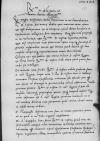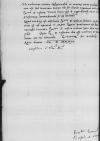Quo magis perspectam habeo singularem in me benevolentiam Reverendissimae Dominationis Vestrae, hoc minus dubito, quin maiorem etiam quam ego ipse voluptatem ex eo acceperit, quod divino beneficio in episcoporum collegium sum cooptatus, deque ista tam propensa in me voluntate ago Reverendissimae Dominationi Vestrae ingentes gratias, quae et si ampliorem mihi fortunam optat cupitque fructus dignitati respondere, tamen ego interea quod datum est, boni consulo, reliquamque expectationem meam Deo committo.
Comitia non esse habita quo animo tulerit
s(acra) or s(erenissima)⌈s(acra)s(acra) or s(erenissima)⌉
Sigismund I Jagiellon (Zygmunt I) (*1467 – †1548), King of Poland and Grand Duke of Lithuania (1506-1548); Duke of Głogów (Glogau) (1499-1506), Duke of Opava (1501-1506), Governor of Silesia (1504-1506); son of King Kazimierz IV Jagiellon and Elisabeth of Austria⌊maiestas regiaSigismund I Jagiellon (Zygmunt I) (*1467 – †1548), King of Poland and Grand Duke of Lithuania (1506-1548); Duke of Głogów (Glogau) (1499-1506), Duke of Opava (1501-1506), Governor of Silesia (1504-1506); son of King Kazimierz IV Jagiellon and Elisabeth of Austria⌋, ex illius cf. [Sigismund I Jagiellon] to Ioannes DANTISCUS [Cracow], [1539-10-10], CIDTC IDL 7066⌊literiscf. [Sigismund I Jagiellon] to Ioannes DANTISCUS [Cracow], [1539-10-10], CIDTC IDL 7066⌋ Reverendissima Dominatio vestra inde etiam quid porro faciendum sit, intelliget.
De moneta quae cf. Ioannes DANTISCUS to Samuel MACIEJOWSKI shortly after 1539-09-09, cf. IDL 7239, CIDTC IDL 7240, letter lost⌊scribitcf. Ioannes DANTISCUS to Samuel MACIEJOWSKI shortly after 1539-09-09, cf. IDL 7239, CIDTC IDL 7240, letter lost⌋ Reverendissima Dominatio Vestra, valde probata fuere
s(acrae) or s(erenissimae)⌈s(acrae)s(acrae) or s(erenissimae)⌉
Sigismund I Jagiellon (Zygmunt I) (*1467 – †1548), King of Poland and Grand Duke of Lithuania (1506-1548); Duke of Głogów (Glogau) (1499-1506), Duke of Opava (1501-1506), Governor of Silesia (1504-1506); son of King Kazimierz IV Jagiellon and Elisabeth of Austria⌊maiestati regiaeSigismund I Jagiellon (Zygmunt I) (*1467 – †1548), King of Poland and Grand Duke of Lithuania (1506-1548); Duke of Głogów (Glogau) (1499-1506), Duke of Opava (1501-1506), Governor of Silesia (1504-1506); son of King Kazimierz IV Jagiellon and Elisabeth of Austria⌋. Cupit cum a Reverendissima Dominatione Vestra, tum a ceteris Council of Royal Prussia the most important local authority in Royal Prussia. It consisted of two bishops (of Ermland (Warmia), who served as the Council’s president, and of Kulm (Chełmno)), three voivodes (of Kulm, Marienburg (Malbork), and Pomerania), three castellans (of Kulm, Elbing (Elbląg), and Gdańsk (Danzig)), three chamberlains (of Kulm, Marienburg, and Pomerania), and representatives of the three Great Prussian Cities – Gdańsk, Thorn (Toruń), and Elbing (ACHREMCZYK 2016, p. 17-18)⌊terrarum Prussiae consiliariisCouncil of Royal Prussia the most important local authority in Royal Prussia. It consisted of two bishops (of Ermland (Warmia), who served as the Council’s president, and of Kulm (Chełmno)), three voivodes (of Kulm, Marienburg (Malbork), and Pomerania), three castellans (of Kulm, Elbing (Elbląg), and Gdańsk (Danzig)), three chamberlains (of Kulm, Marienburg, and Pomerania), and representatives of the three Great Prussian Cities – Gdańsk, Thorn (Toruń), and Elbing (ACHREMCZYK 2016, p. 17-18)⌋ rationem sibi ostendi, qua efficere queat, ut deinceps a percutiendis nummis abstineant. Valde gratum fecerit Reverendissima Dominatio Vestra
s(acrae) or s(erenissimae)⌈s(acrae)s(acrae) or s(erenissimae)⌉
Sigismund I Jagiellon (Zygmunt I) (*1467 – †1548), King of Poland and Grand Duke of Lithuania (1506-1548); Duke of Głogów (Glogau) (1499-1506), Duke of Opava (1501-1506), Governor of Silesia (1504-1506); son of King Kazimierz IV Jagiellon and Elisabeth of Austria⌊maiestati regiaeSigismund I Jagiellon (Zygmunt I) (*1467 – †1548), King of Poland and Grand Duke of Lithuania (1506-1548); Duke of Głogów (Glogau) (1499-1506), Duke of Opava (1501-1506), Governor of Silesia (1504-1506); son of King Kazimierz IV Jagiellon and Elisabeth of Austria⌋, si haec illi consilia rationesque perscriptas primo quoque tempore miserit. Neque enim obscurum est
s(acrae) or s(erenissimae)⌈s(acrae)s(acrae) or s(erenissimae)⌉
Sigismund I Jagiellon (Zygmunt I) (*1467 – †1548), King of Poland and Grand Duke of Lithuania (1506-1548); Duke of Głogów (Glogau) (1499-1506), Duke of Opava (1501-1506), Governor of Silesia (1504-1506); son of King Kazimierz IV Jagiellon and Elisabeth of Austria⌊maiestati regiaeSigismund I Jagiellon (Zygmunt I) (*1467 – †1548), King of Poland and Grand Duke of Lithuania (1506-1548); Duke of Głogów (Glogau) (1499-1506), Duke of Opava (1501-1506), Governor of Silesia (1504-1506); son of King Kazimierz IV Jagiellon and Elisabeth of Austria⌋, quantum incommodi ex eo ad cunctas ditiones eius perveniat, quod contra edictum moneta nihilominus cuditur.
Domino Paweł Płotowski (*ca. 1485 – †1547), in 1523, after the death of Fabian von Lusian (Luzjański), Płotowski was one of the King's four candidates for the post of the bishop of Ermland; in 1530 and 1537, after the death of Jan Konopacki (Johann von Konopat) Sr and Dantiscus' transfer to the bishopric of Ermland, he made an effort to obtain the dignity of bishop of Kulm; from 1522 Provost of the Ermland (Warmia) Chapter, and from 1523 Canon of Ermland; secretary to Crown Grand Chancellor Krzysztof Szydłowiecki, and from 1533 royal secretary and courtier; in the thirties and forties several times royal envoy to the Royal Prussian Estates (SBKW, p. 191; KOPICZKO 2, p. 249-250)⌊PlothowskiPaweł Płotowski (*ca. 1485 – †1547), in 1523, after the death of Fabian von Lusian (Luzjański), Płotowski was one of the King's four candidates for the post of the bishop of Ermland; in 1530 and 1537, after the death of Jan Konopacki (Johann von Konopat) Sr and Dantiscus' transfer to the bishopric of Ermland, he made an effort to obtain the dignity of bishop of Kulm; from 1522 Provost of the Ermland (Warmia) Chapter, and from 1523 Canon of Ermland; secretary to Crown Grand Chancellor Krzysztof Szydłowiecki, and from 1533 royal secretary and courtier; in the thirties and forties several times royal envoy to the Royal Prussian Estates (SBKW, p. 191; KOPICZKO 2, p. 249-250)⌋ defuturus non sum ac enitar quantum potero, ut ne quid ei in Rome (Roma), city in central Italy, on the Tiber river, seat of the Holy See⌊urbeRome (Roma), city in central Italy, on the Tiber river, seat of the Holy See⌋ negotii exhibeatur.
De domino Stanisław Kostka (*1487 – †1555), as a leader of the so-called nobles' party active in Royal Prussia since 1536, Kostka stood in opposition to most of the members of the Council of Royal Prussia, who wanted to maintain the autonomy of the province and a "balance of power" in terms of governance. The tension between the Prussian Subtreasurer and the Council had been increasing since the Diet in Graudenz (Grudziądz) in 1533. Kostka, connected with the royal court since his youth, was sent to Graudenz as the King's deputy and, contrary to custom, decided to take part in the proceedings. In response to such a step, the Council members stopped the meeting. Kostka accused them of hostility towards the Poles and intervened on this matter at the court. In the absence of the then Bishop of Ermland (Mauritius Ferber) it was Dantiscus who chaired the Graudenz Diet. The incident badly harmed his future relationships with Kostka; 1531-1555 Treasurer of the Prussian lands and Treasurer of Marienburg (Malbork); 1544-1545 Castellan of Elbing (Elbląg), 1545-1546 Castellan of Kulm (Chełmno); 1546-1549 Vice-Voivode of Kulm; 1546-1551 Voivode of Pomerania; 1551-1555 Voivode of Kulm (PSB 14, p. 356; Urzędnicy 5/2, p. 216; MAŁŁEK 1976, p. 119-123)⌊CosthkaStanisław Kostka (*1487 – †1555), as a leader of the so-called nobles' party active in Royal Prussia since 1536, Kostka stood in opposition to most of the members of the Council of Royal Prussia, who wanted to maintain the autonomy of the province and a "balance of power" in terms of governance. The tension between the Prussian Subtreasurer and the Council had been increasing since the Diet in Graudenz (Grudziądz) in 1533. Kostka, connected with the royal court since his youth, was sent to Graudenz as the King's deputy and, contrary to custom, decided to take part in the proceedings. In response to such a step, the Council members stopped the meeting. Kostka accused them of hostility towards the Poles and intervened on this matter at the court. In the absence of the then Bishop of Ermland (Mauritius Ferber) it was Dantiscus who chaired the Graudenz Diet. The incident badly harmed his future relationships with Kostka; 1531-1555 Treasurer of the Prussian lands and Treasurer of Marienburg (Malbork); 1544-1545 Castellan of Elbing (Elbląg), 1545-1546 Castellan of Kulm (Chełmno); 1546-1549 Vice-Voivode of Kulm; 1546-1551 Voivode of Pomerania; 1551-1555 Voivode of Kulm (PSB 14, p. 356; Urzędnicy 5/2, p. 216; MAŁŁEK 1976, p. 119-123)⌋ bene fecit Reverendissima Dominatio Vestra, quod eum ita humaniter accepit, nam inimicitias mortales amicitias vero immortales esse convenit apud christianum praesertim episcopum. Spero negotium illius tranquillum exitum et comicum habiturum.
 BCz, 1597, p. 862
BCz, 1597, p. 862
Mandatum contra Alexander Sculteti (Scholtcze) (*ca. 1485 – †1570), doctor of canon law, cartographer, historian and friend of Copernicus; accused by Dantiscus and Stanisław Hozjusz (Hosius) of Sacramentarian heresy, in 1540 banished by King Sigismund I Jagiellon; in 1541 imprisoned by the Inquisition in Rome; after release from prison in 1544 he stayed in Rome for the rest of his life; 1509-1516 notary at the Roman Curia; 1519-1541 Canon of Ermland (Warmia), 1530-1539 Chancellor of the Ermland Chapter; 1536-1538 administrator of the komornictwo of Mehlsack (Melzak, today Pieniężno) (KOPICZKO 2, p. 299; SBKW, p. 219-220)⌊AlexandrumAlexander Sculteti (Scholtcze) (*ca. 1485 – †1570), doctor of canon law, cartographer, historian and friend of Copernicus; accused by Dantiscus and Stanisław Hozjusz (Hosius) of Sacramentarian heresy, in 1540 banished by King Sigismund I Jagiellon; in 1541 imprisoned by the Inquisition in Rome; after release from prison in 1544 he stayed in Rome for the rest of his life; 1509-1516 notary at the Roman Curia; 1519-1541 Canon of Ermland (Warmia), 1530-1539 Chancellor of the Ermland Chapter; 1536-1538 administrator of the komornictwo of Mehlsack (Melzak, today Pieniężno) (KOPICZKO 2, p. 299; SBKW, p. 219-220)⌋ in manus meas perlatum non est, sed inquiram tamen, ubi sit. Sicubi repertum erit, mittam hidden by binding⌈[ittam]ittam hidden by binding⌉ Reverendissimae Dominationi Vestrae. Veniet brevi ipse dominus Andrzej Czarnkowski (*1507 – †1562), 1531 Gniezno canon; 1537-1541 papal chamberlain; 1540 Poznań and Cracow canon; 1541 scholastic in Włocławek; 1541 royal secretary; 1543 scholastic in Cracow; 1545 prelate-custos in Płock; 1545 administrator of Cracow archbishopric (after the death of Piotr Gamrat); 1553 bishop of Poznań; 1540-1541 King Sigismund I's envoy to the Roman King Ferdinand von Habsburg and Hungary; 1541 - to Imperial Diet; 1550 - to Emperor Charles V (PSB 4, p. 216-217)⌊CzarnkowskiAndrzej Czarnkowski (*1507 – †1562), 1531 Gniezno canon; 1537-1541 papal chamberlain; 1540 Poznań and Cracow canon; 1541 scholastic in Włocławek; 1541 royal secretary; 1543 scholastic in Cracow; 1545 prelate-custos in Płock; 1545 administrator of Cracow archbishopric (after the death of Piotr Gamrat); 1553 bishop of Poznań; 1540-1541 King Sigismund I's envoy to the Roman King Ferdinand von Habsburg and Hungary; 1541 - to Imperial Diet; 1550 - to Emperor Charles V (PSB 4, p. 216-217)⌋, ex eo cognoscemus, quemadmodum se res habeat.
Quod tardius est absolutus Reverendissimae Dominationis Vestrae servitor, eo factum est, quod aegrotat
s(acra) or s(erenissima)⌈s(acra)s(acra) or s(erenissima)⌉
Sigismund I Jagiellon (Zygmunt I) (*1467 – †1548), King of Poland and Grand Duke of Lithuania (1506-1548); Duke of Głogów (Glogau) (1499-1506), Duke of Opava (1501-1506), Governor of Silesia (1504-1506); son of King Kazimierz IV Jagiellon and Elisabeth of Austria⌊maiestas regiaSigismund I Jagiellon (Zygmunt I) (*1467 – †1548), King of Poland and Grand Duke of Lithuania (1506-1548); Duke of Głogów (Glogau) (1499-1506), Duke of Opava (1501-1506), Governor of Silesia (1504-1506); son of King Kazimierz IV Jagiellon and Elisabeth of Austria⌋, quae tamen est iam nonnihil recreata. Reverendissima Dominatio Vestra moram hanc boni consulet.
Opto Reverendissimam Dominationem Vestram diu esse incolumem et felicem. Cui me commendo.



 BCz, 1597, p. 864
BCz, 1597, p. 864